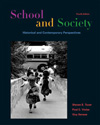 |  School and Society: Historical and Contemporary Perspectives, 4/e Stephen E. Tozer,
The University of Illinois, Chicago
Paul C. Violas
Guy Senese,
Northern Arizona University
School as a Public Institution: The Common-School Era
Internet ExercisesRead about Aristotle and Jean-Jacques Rousseau, two highly influential educational philosophers, and see how their thinking continues to influence education today. This look at their theories, dating from ancient Greece and from 18th-century France, provides an illustration of the connections between educational theory and educational practice. As you read, be aware of your own thinking about teaching and learning and how your beliefs correspond with or differ from Aristotle's and Rousseau's. You may be surprised at what you discover. - Jean Jacques Rousseau and Informal Education
A look at Rousseau, his life and influences and an overview of his educational perspectives. Rousseau's book Émile was the most significant book on education after Plato's Republic, according to many, and had a profound impact on conceptions of childhood and teaching and learning. - Knowledge (Aristotle)
Aristotle's very influential three-fold classification of disciplines as theoretical, productive, or practical remains an excellent starting point for exploring different forms of knowledge.
|
|



 2002 McGraw-Hill Higher Education
2002 McGraw-Hill Higher Education